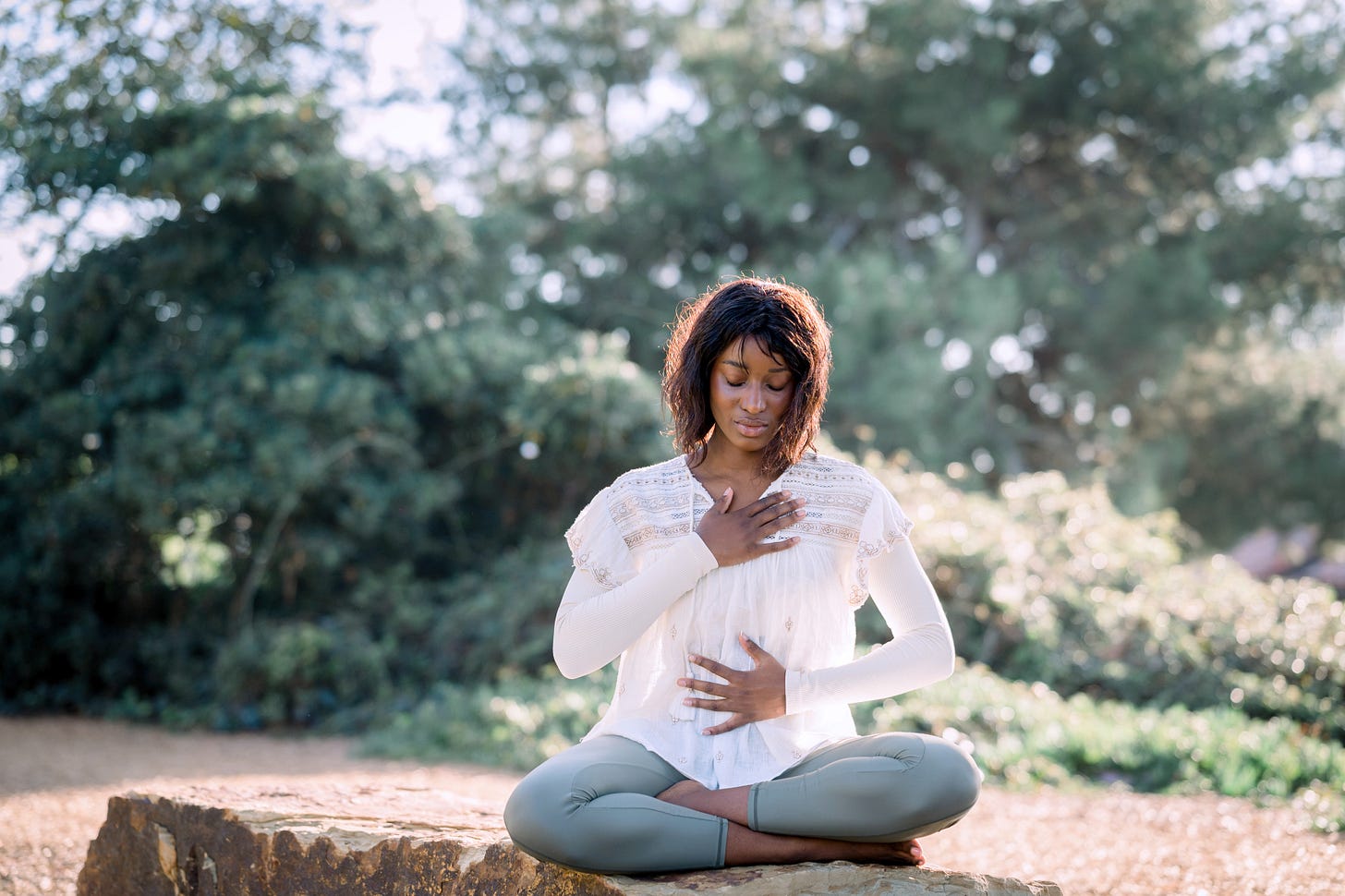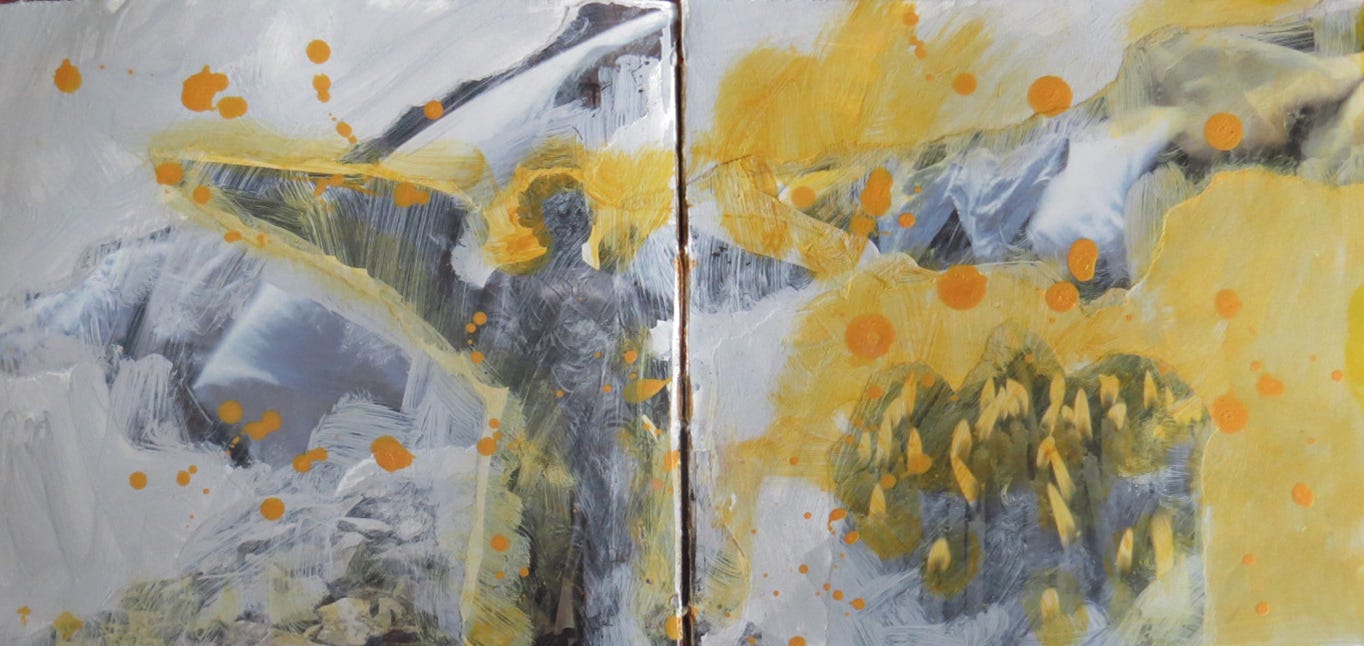3 Things the Soul Needs
simple yet profound
On the go? Listen instead.
When we talk about "soul," we're on a slippery slope of words and concepts that, while familiar, are not well understood.
As someone who offers "soul work" and considers themselves a "soul worker," I've thought a lot about The Soul.
Let's explore a little together.
"Soul" comes from the Greek word "psyche."
In psychology, the psyche is the totality of the human mind, conscious and unconscious. Many thinkers, including Carl Jung, also include in this definition the overlap and tension between a human being's personal and collective elements. Psychology is the scientific or objective study of the psyche. ~paraphrased from the Wikipedia entry for "psyche."
Merriman-Webster helps us with three succinct definitions of "soul"...
1. the immaterial essence, animating principle, or actuating cause of an individual life
2. the spiritual principle embodied in human beings, all rational and spiritual beings, or the Universe
3. a person's total Self
The American Heritage Dictionary gives some fascinating insight...
A part of humans regarded as immaterial, immortal, separable from the body at death, capable of moral judgment, and susceptible to happiness or misery in a future state.
In Aristotelian philosophy, an animating or vital principle inherent in living things and endowing them in various degrees with the potential to grow and reproduce, to move and respond to stimuli (as in the case of animals), and to think rationally (as in the case of humans).
I'm not a huge fan of Aristotle. I lean more toward Plato and Pythagoras when it comes to ancient philosophers.
Plato was the first to believe that the Soul was the source of life and the mind. He also saw the Soul as having three parts.
The Logos: located in the head and related to reason, regulating the other parts.
The Thymos: located near the chest region and connected to the spirit.
The Eros: situated in the stomach and related to one's desires.
If you understand the chakra system, you'll immediately notice that the Logos corresponds to the Third Eye, the Thymos to the Heart, and the Eros to the Solar Plexus + Sacral Chakras.
This is helpful because it's in these three areas of sensation that many people feel their Soul resides: the head, heart, and belly. It's where we sense our inner knowing, our intuition. So those areas of our body are likely to experience physical sensations when our Soul is moved with joy, grief, wonder, awe, fear, or any other emotive experience.
Pythagoras believed in the immortality and transmigration of the Soul (reincarnation), thus the possibility that one's current decisions can have lasting effects on one's future life. We could also expand this idea to recognize that our choices in the past, including potentially past lives, influence our present and future.
Christianity has a shockingly unclear concept of the Soul.
The early Christian philosophers initially adopted the Greek concept of the Soul's immortality and thought of the Soul as being created by God and infused into the body at conception. ~ Encyclopaedia Britannica
Beyond that, if you google "what is the Christian concept of the soul," the answers will boggle your mind. They're a pastiche of denominational biases and mixed and matched bits of philosophy.
So, where does this leave us? The best way to describe the situation is that we all know we have a soul, but we don't know exactly what it is. Not enough to precisely define it with words.
That shouldn't in any way detract from the importance of our souls. On the contrary, it's a clue that we're at the edge of mystery, and that's a profound place to be.
Like our body, our Soul has needs. The body requires nutrition, exercise, rest, oxygen, and water. The Soul has different equally important requirements, yet we often forget about them and starve our souls of life-giving support.
I'll suggest three things the Soul regularly needs to stay healthy.
Solitude
This is going to look different for introverts and extroverts. Since I am an introvert, and I know many of you are, too, I'll comment on that. One of you who is an extrovert can share some ideas in the comments since I can't effectively speak to what an extroverted Soul might need in terms of solitude. How much and how often and the nature of the solitude itself will be different for you.
By definition, solitude is time alone, apart from others. This might be difficult for friends and family to understand. The desire to be alone is often not well understood. Others might think you don't want to be around them and take it personally. Sometimes you'll have someone whose need for you causes them to try and prevent you from separating for a little while because it makes them feel deeply insecure. Other times people will suspect you are depressed.
None of those things is a reason to forego a solitude practice. Instead, solitude brings much-needed quiet to your body and Soul. Our world is loud and filled with the distractions of phones, alerts, ringtones, tablets, TVs, watches, security systems, and computers that talk to you (thank you, Siri, that will be all.) Solitude allows a comforting blanket of silence to descend over you.
It is in silence that the Soul can be. The deep waters of inner knowing can only be experienced when outer and inner silence exists.
In this silence, the Soul can enter repose. You're entire being can settle into stillness. For the Soul's health, you need to build purposeful pauses into your life. Schedule times to retreat from the demands of life. Solitude is sacred.
Solitude also creates the conditions for the Soul to encounter the Divine. That alone is reason enough to cultivate times of solitude. Solitude may become your preferred way of life if caring for your Soul and nurturing its growth become a priority.
Nature
I've had a deep love for nature since I was a child. I feel a connectedness with trees, plants, stones, sky, sea, and animals that goes beyond anything I experience with all but a few people on this planet.
With all of the public awareness around the climate crisis and the many efforts to bring people and nature together in meaningful ways, I fear the demi-gods of technology are hell-bent on continuing to lure us out of natural forests and into virtual ones.
This makes nature for your Soul more critical today than ever before.
Your Soul needs nature. In nature, the Soul understands its place in the Universe and its relationship to the Divine.
“A walk in nature, walks the soul back home.”
– Mary Davis
Like solitude, nature provides an environment conducive to the Soul. When you learn to slow the pace of your mind and breath and connect your energy to the earth beneath your feet, your awareness of being a Soul in a body is heightened. This sensory experience then opens the channels to the higher Self allowing you to experience the oneness, the connectedness of everything.
Energy flows from the earth, through the network of mycelium under the soil, through the plants, into the animals who eat plants, and up through the food chain. The earth radiates her energy which flows and mingles with the energy of water and air. You feel the web of all things, and if you spend enough time in nature, you will eventually become so sensitive that you will feel the vibration of the individual thread that you are, in relationship to all the other vibrating threads in the web.
Time spent in nature is far more mystical and Soul nourishing than being swept away by beautiful scenery, soothed by peace, or reinvigorated by fresh air.
The Soul in nature is a state of being that helps to recalibrate an out-of-balance existence at the spiritual level.
Creative Expression
Your Soul needs to have a voice, a means of expression. The mother tongue of the Soul, its entire complex language, is composed of images.
We dream in images. We create images that our inner eye sees as we listen to a story being read. We respond to images in powerful ways, especially when those images are symbols, one thing that points to another hidden, hard-to-describe concept or archetype.
Compelling art is a symbol that points to a concept beyond what is seen on the surface.
A picture is worth a thousand words. ~ Fred R. Barnard
When you begin to engage with the life of the Soul, you will quickly find that there is so much to be said that is complex, nuanced, and ineffable that words fail you. On the other hand, images can convey vast amounts of layered information through a single picture or scrawled mark.
If writing is your preferred mode of creative expression, you'll soon discover that metaphor becomes a necessary component of your writing, as will poetry or prose that leans towards poetry. You'll find that painting pictures with words becomes a viable avenue of creative expression.
Whatever modality you prefer, you need a method of creative expression to give your Soul a voice.
Voice, music, and movement can all be ways of creating images. The tone and emotional quality of voice can paint pictures in the listener's mind, as can instrumental music. Dance creates a series of postures that are in themselves images and can communicate to the viewer. While voice, music, and dance assume a viewer or listener, one is not necessarily needed. The one who sings, plays, or dances is in the process of Soul expression.
This experiential quality extends to visual artists and writers as well. To be in the process of painting or writing is active voicing of the Soul. It is the moment when the Soul speaks. In those moments of dynamic creation, the Soul is expressed, and inner transformation is possible.
Some of you may at this moment be thinking, "I have no talent. I don't know how to create anything."
Those who have worked with me know that creating can be as simple as owning a glue stick, scissors, paper, and found images from discarded books and magazines.
Found image collage for art journaling, JourneyCircles™ or SoulCollage© makes the creative process welcoming to everyone.
If you are a painter, or writer, or love expressive movement, that is beautiful. I work with clients who already have a robust creative practice and those who are just beginning. However, everyone can find a creative approach that gives their Soul a voice.
I love found image collages and mixed media for creating stand-alone art and art journals. You'll know I can draw and paint if you read my recent article Drawing Lessons. However, I prefer the simple process of "cut/tear and glue" working with found images for soul work.
This process allows for less linear thinking and more intuitive choosing in a relaxed state that can feel trance-like, more like a waking dream. This alternate state of consciousness quiets the persona and ego and allows the Soul to speak and produce powerful works that can be unpacked later to discover their meaning and messages.
Simple is Profound
Solitude, nature, and creativity are simple, yet they are profound. Deep soul work requires you to incorporate these three into your daily life in the same way eating, sleeping, and exercising are part of your daily routine.
The wonderful thing about this potent trio is that they can overlap. Time in nature can also be a time of solitude. Creating can be done in nature as a solitary pursuit. Meditation as a solo activity can be paired with being outdoors. Time spent with mother earth can be the inspiration for creative endeavors.
It is vital to recognize what the Soul needs and value your inner life enough to engage in practices that help it grow.
Inevitably we will all have our favorite ways of Soul-tending. So what do you do to offer health and healing to your Soul? Which are your favorite practices? Are there other things you would add to this list?
Tell me in the comments, and let's discuss this often-overlooked topic.









Creativity is very soul healing for me. What I need is more time spent in nature and peaceful solitude. I live in a city so I don’t get that, and I know my soul is unbalanced because of it.